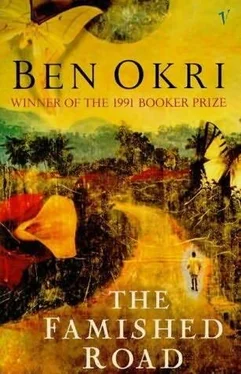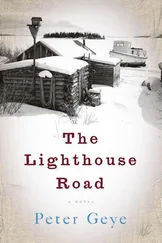Ben Okri - The Famished Road
Здесь есть возможность читать онлайн «Ben Okri - The Famished Road» весь текст электронной книги совершенно бесплатно (целиком полную версию без сокращений). В некоторых случаях можно слушать аудио, скачать через торрент в формате fb2 и присутствует краткое содержание. Жанр: Современная проза, на английском языке. Описание произведения, (предисловие) а так же отзывы посетителей доступны на портале библиотеки ЛибКат.
- Название:The Famished Road
- Автор:
- Жанр:
- Год:неизвестен
- ISBN:нет данных
- Рейтинг книги:5 / 5. Голосов: 1
-
Избранное:Добавить в избранное
- Отзывы:
-
Ваша оценка:
- 100
- 1
- 2
- 3
- 4
- 5
The Famished Road: краткое содержание, описание и аннотация
Предлагаем к чтению аннотацию, описание, краткое содержание или предисловие (зависит от того, что написал сам автор книги «The Famished Road»). Если вы не нашли необходимую информацию о книге — напишите в комментариях, мы постараемся отыскать её.
The Famished Road — читать онлайн бесплатно полную книгу (весь текст) целиком
Ниже представлен текст книги, разбитый по страницам. Система сохранения места последней прочитанной страницы, позволяет с удобством читать онлайн бесплатно книгу «The Famished Road», без необходимости каждый раз заново искать на чём Вы остановились. Поставьте закладку, и сможете в любой момент перейти на страницу, на которой закончили чтение.
Интервал:
Закладка:
BOOK TWO
ONE
THE WORLD IS full of riddles that only the dead can answer. When I began to go to Madame Koto’s place I understood why the spirits were curious about her. I went to her bar in the afternoons after school. She was often in the backyard.
She was often digging the earth, planting a secret, or taking one out. One day I hid and watched her and saw her plant round white stones in the earth. I did not know their significance or even if they had any.
Sometimes when I came in from school she would be in the bushes in the backyard and as soon as she heard me she would shout:
‘Sit down! Sit down and attract customers! Draw them here!’
I would sit and swot flies. The palm-wine everywhere made the flies so plentiful that sometimes when I inhaled I was sure I breathed them in as well. I would sit in the empty bar, near the earthenware pot, and would watch passers-by through the curtain strips. At first when I sat there alone no one came to drink and it seemed as if I was bringing more bad luck than good.
In the afternoons the bar was empty. One or two people who had no jobs would come in and haggle over the price of a glass of palm-wine. The moment someone came into the bar Madame Koto treated them respectfully. What she hated was people standing outside uncertain. She preferred them to go away rather than come in. She was very decided in this respect.
Women sometimes came by in the afternoons. They were mostly hawkers of sun-bleached goods. They talked about their children or their husbands or about the forthcoming elections and about the thugs and violence, the people of different parties killed in skirmishes deep in the country. The women always came with bundles on their heads. They often looked both sad and robust, or spirited and lean. Many of them werehawkers ontheirway tothemarketorjuststoppingtogetsomeshadeandsome respite from the dusty ghetto paths. They talked in high-pitched voices and congregatedroundMadameKotointhebackyardasshesat onastoolpreparingthe evening’s peppersoup.
When the women came by they always teased me, saying:
‘There’s the boy who would marry my daughter. Look at him, he’s being trained in the ways of women.’
They all had children strapped to their backs. The ways of women: I learned a lot about what was happening in the country through them. I learned about the talk of Independence, about how the white men treated us, about political parties and tribal divisions. I would sit in the bar, on a bench, with my feet never touching the floor, and would listen to their stories of lurid sexual scandals as sleep touched my eyes with the noon-day heat. It was always hot and the flies and wall-geckos, the gnats and midges, were always active.
The women would talk for a while. Madame Koto would buy a thingor two from them, and they would set out on the hot roads, touching me or smiling as they went.
Sometimes Madame Koto would vanish altogether and leave me in the empty bar. Customers would come in and I would stare at them and they at me.
‘Any palm-wine?’‘Yes.’‘Serve us, then.’I wouldn’t move.‘You don’t want to serve us?’ I wouldn’t speak.‘Where is your madame?’‘I don’t know.’They would wander off to the backyard and come back and sit for a while.‘What is your name?’I wouldn’t tell them. They would leave disgusted and I wouldn’t see them again for a long time afterwards. When Madame Koto returned and I told her about the customers she spoke harshly to me. ‘Why didn’t you come and call me?’ ‘Where?’ ‘In my room.’ ‘Where?’
‘Come.’ She showed it to me. That was when I realised she had a room in the compound. Her room was near the toilet. She never let me in, and the door was always locked. I also learnt that in the afternoons she often went to the market to buy ingredients for her evening’s cooking, finding the right herbs for her flavoured peppersoup. Sometimes she bought ground tobacco and rolled it around in her mouth all afternoon long.
One afternoon I was sitting in my customary position when the earthenware pot began to rattle. I put my hands on it and it stopped. I took my hands off and it rattled. I went to the backyard, looking around for some sort of explanation. When I came back I saw, standing in the doorway, three of the strangest-looking men. They were unusually tall and very black. Their eyes were almond-shaped, they had small noses, their arms were quite short, and the smiles on their faces never altered. They spoke among themselves in nasal voices that sounded as if they had no chests. I couldn’t understand what they said. They refused to move from the doorway. They looked around thebar, inspectingit, studyingtheplace,eachfacingaseparatedirection,asif their different heads connected a central intelligence.
Their eyes were deep and dull and confusing. I could not be sure at any given moment if they were looking at me or at the ceiling. I indicated the benches. They shook their heads simultaneously. They just stood there, completely blockingout the light from the door. I looked at their short arms, limp at their sides, and my head nearly fell off in fright when I discovered that all of them without exception had six fingers on each hand. Then I noticed that they were barefoot and their toes were inturned like those of certain animals. They radiated a potent and frighteningdignity. I got down from the bench and ran to Madame Koto’s room and shouted that she had three strange customers. She bustled out towards the bar, tightening her wrapper round her, spitting out the ground tobacco in her mouth. When I got there she was outside. I looked around. The flies and wall-geckos had gone. A black cat peeped at me from the backyard door. I went after it and it leapt over the wall of the compound. I went to the barfront and couldn’t find Madame Koto. I went into the bar and she was wipingthetabletops with awet rag, saying:
‘I didn’t see anybody. Call me only when customers arrive, you hear?’
I didn’t nod or say anything.
After Mum recovered from her illness she became sadder and leaner and more sober. Each morning when she woke up from sleep she went around the room as if something had knocked her out the night before and she could not place what it had been. Dad took to going to bed late and waking early. When I got up in the mornings he had gone off to look for jobs. Mum would potter about the room, muttering to herself about rats and poverty.
On somemorningsIwoketothecommotionofMumthrashingthecupboardwitha broom. She lashed at the cupboard, whipped underneath it, flogged her basins of provisions and sacks of garri as if they had personally offended her. Sometimes cockchafers scattered everywhere under her lashingand they clambered on to my face and I would jump up. Mum, oblivious, wreaking vengeance, would carry on lashing them. She would sweep their corpses on to a pan, dump the broom, go out to dispose of the cockchafers, and we would settle down to eat. She always gave me some bread to take to school and she always walked me as far as the junction and then carried on, basin balanced on her head, through thestreets, crooningout her provisions.
For a while Dad disappeared from my life. I woke up and he wouldn’t be there. I went to sleep and he wouldn’t have returned. He worked very hard and when I saw him on Sundays he seemed to be in agony. His back always hurt and in the evenings me and Mum had to walk on him to ease the pain. His back was very strong and ridged and I could never balance on it. When Mum trod on him his spine creaked and we took to rubbing him with a foul-smelling ointment we got from an itinerant herbalist. Dad worked hard carrying heavy loads at the garage and marketplaces and he earned very little money. Out of what he earned he paid the creditors, who came to our room every evening to remind us that they were still alive. And out of what was left we could barely manage to pay the rent and eat. After some days of not seeing Dad I asked Mum what had happened to him.
Читать дальшеИнтервал:
Закладка:
Похожие книги на «The Famished Road»
Представляем Вашему вниманию похожие книги на «The Famished Road» списком для выбора. Мы отобрали схожую по названию и смыслу литературу в надежде предоставить читателям больше вариантов отыскать новые, интересные, ещё непрочитанные произведения.
Обсуждение, отзывы о книге «The Famished Road» и просто собственные мнения читателей. Оставьте ваши комментарии, напишите, что Вы думаете о произведении, его смысле или главных героях. Укажите что конкретно понравилось, а что нет, и почему Вы так считаете.












